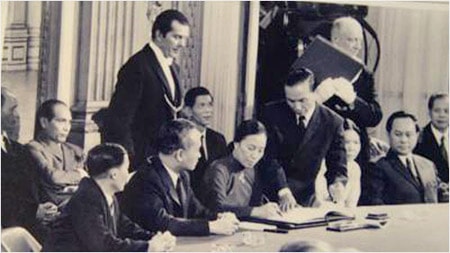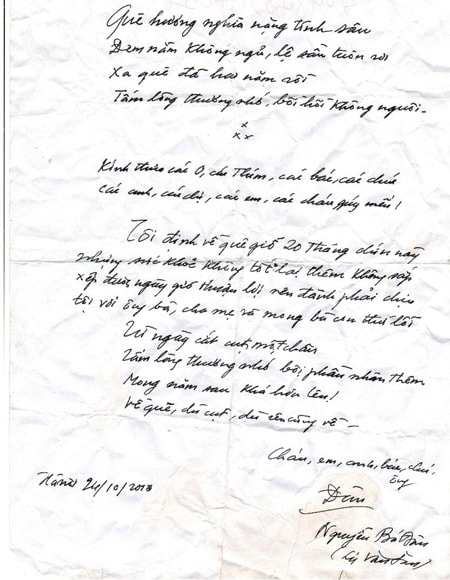Ly Van Sau - excellent journalist and diplomat
(Baonghean) - On January 25, 1969, at the press conference after the first official session of the Four-Party Conference in Paris on Vietnam, when dozens of cameras and microphones were pointed at the spokesman of the National Liberation Front Delegation of South Vietnam, an American journalist held up a map of the South and asked: "Your Front often boasts that it controls two-thirds of the territory of South Vietnam, so would you please show me on this map where those liberated zones are?"
The spokesman of the Liberation Front Delegation immediately replied: "What you asked is also what the US Military Command in Saigon wants to know. Please read the US military announcement today and see where their planes bombed in South Vietnam. Those places are our liberated zones."

Comrade Ly Van Sau (2nd from right) witnessed Minister Nguyen Thi Binh sign the Paris Agreement ending the war and restoring peace in Vietnam (January 27, 1973).
The person with that brilliant answer, the answer that surprised, astonished, admired hundreds of journalists present in the press conference room and touched the hearts of millions of soldiers and people across the country as well as friends from all over the world, was veteran revolutionary, journalist, diplomat Ly Van Sau, an outstanding son of his homeland Nghe An.
Mr. Ly Van Sau's birth name was Nguyen Ba Dan, born on November 5, 1924 in Yen Nhan village, Nhan Thanh commune, Yen Thanh district, in a Confucian family with a tradition of patriotism. His father was bachelor Nguyen Trong Thuan, a Confucian intellectual, an honest mandarin, a close friend of the patriot Huynh Thuc Khang, who protected and sheltered many revolutionary soldiers. Since childhood, intelligent and studious, Nguyen Ba Dan was sent by his parents to primary school in Phu Yen, then to secondary school at Hue National School and received a baccalaureate degree with honors. Educated and guided by his brothers and friends such as Ta Quang Buu and Phan Anh, Nguyen Ba Dan participated in the dissemination of the national language to the working people in An Cuu market in 1944.
In 1945, Nguyen Ba Dan returned to Yen Thanh to continue participating in youth activities, spreading the national language and was appointed by Viet Minh cadres as a youth leader to gather young people and prepare for an uprising to seize power. After the August Revolution in 1945, Nguyen Ba Dan set off
In 1949, young journalist Nguyen Ba Dan accepted a job at the Inter-Zone V Party Committee and was assigned the important responsibility of Director and Editor-in-Chief of the Southern Voice Radio Station of Inter-Zone V. Being close to his brothers and friends such as Pham Van Dong, Nguyen Duy Trinh, Nguyen Minh Vy, from a patriotic intellectual, Nguyen Ba Dan became a propaganda officer, a prestigious journalist, contributing effectively on the ideological and cultural front in the Inter-Zone V battlefield during the fierce years of resistance against the French.

Comrade Ly Van Sau's handwriting sent back to his hometown before he passed away.
During the period of 1953-1954, Nguyen Ba Dan was the Secretary of the Central Party Committee in Inter-Zone V. In the fall of 1954, he was a liaison officer at the Joint Armistice Committee next to the International Commission on the Geneva Agreement. In 1954, he was regrouped to the North and assigned to the Central Unification Committee. From January 1957 to September 1960, he was sent to Moscow to study at the Senior Party School of the Central Committee of the Communist Party of the Soviet Union.
Just during the journey on the train from Dong Dang station to China and then to Russia, Nguyen Ba Dan took the opportunity to learn Russian. When he set foot on Russian soil, he worked as a Russian interpreter for the whole group!
Returning to Vietnam, Nguyen Ba Dan took up a position at the Press Department of the Central Propaganda Department. In 1962, he was sent to Cuba as Deputy Chief Representative of the National Liberation Front of South Vietnam.
After his term ended and he returned to Vietnam, he worked at the Central Reunification Committee. From November 1968 to September 1973, Ly Van Sau was an official member, advisor and spokesman for the delegation of the National Liberation Front of South Vietnam at the Paris Conference on Vietnam. With the ability to use many foreign languages fluently, with the profound knowledge and sharp, humorous thinking of a man from Nghe An, with the tone of a diplomat, a talented journalist, in nearly 5 years, through nearly 100 press conferences in Paris and hundreds of meetings at forums in more than 40 countries, Spokesperson Ly Van Sau answered hundreds of thousands of unexpected, difficult questions, wrote hundreds of articles, excellently completed his tasks on the diplomatic and propaganda fronts, contributing significantly to the success of the Paris Conference and building a theoretical system on the revolutionary diplomacy of our Party and people.
After the liberation of the South (April 30, 1975), he was assigned to work at the Central Propaganda Department, directly serving as Deputy Director of Ho Chi Minh City Television Station.
From 1977 to 1990, he was assigned important tasks: Deputy Head of the Vietnam Radio and Television Commission and Editor-in-Chief of the Central Television Station (Vietnam Television); Editor-in-Chief of the Voice of Vietnam; Deputy Editor-in-Chief of the Vietnam News Agency; Secretary of the Executive Committee of the Vietnam Journalists Association; Vice President of the Vietnam-Cuba Friendship Association.
In his new positions, Ly Van Sau always demonstrated the qualities, mettle, and experience of an erudite theorist, a talented diplomat, a great and close friend of the Cuban people, a leader on the ideological and journalistic front, lifelong loyalty to the Party's revolutionary ideals, and always exemplary in implementing Uncle Ho's teachings of "diligence, thrift, integrity, impartiality, and selflessness".
Coming from the poor but resilient countryside of Nghe An, growing up in Hue, working in the Central region's V region, ending up in Ho Chi Minh City and the capital Hanoi, traveling across five continents and four oceans to do propaganda, journalism, and foreign affairs work, the life of veteran revolutionary, great journalist, and excellent diplomat Nguyen Ba Dan - Ly Van Sau set a shining example of studying Ho Chi Minh's ideology and morality.
He was awarded the 65-year Party membership badge, the Second-class Independence Medal and many other noble awards by the Party and State.
The talented journalist and diplomat Nguyen Ba Dan - Ly Van Sau, "a Mandarin (1) of the Ho Chi Minh era, an outstanding son of the Hong River and Lam mountains, passed away at 10:00 a.m. on April 30, 2012, exactly 37 years ago when our army entered to liberate Saigon - Gia Dinh, creating the Great Victory of Spring 1975. That man, that career "like a grain of sand, like a drop of water" (2) lives forever with the people, with the country.
(1) words used by journalist Duong Quang Minh;
(2) words used by Ly Van Sau in his memoir "A Life"
Ngo Duc Tien






